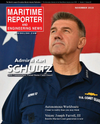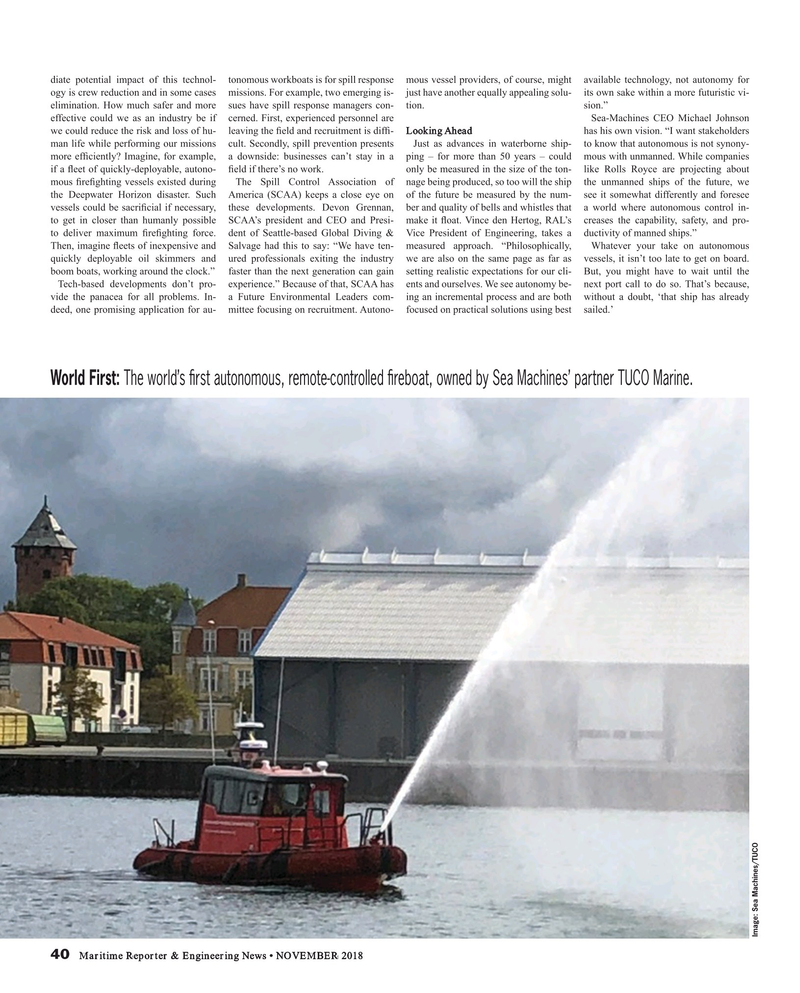
Page 40: of Maritime Reporter Magazine (November 2018)
Workboat Edition
Read this page in Pdf, Flash or Html5 edition of November 2018 Maritime Reporter Magazine
diate potential impact of this technol- tonomous workboats is for spill response mous vessel providers, of course, might available technology, not autonomy for ogy is crew reduction and in some cases missions. For example, two emerging is- just have another equally appealing solu- its own sake within a more futuristic vi- elimination. How much safer and more sues have spill response managers con- tion. sion.” effective could we as an industry be if cerned. First, experienced personnel are Sea-Machines CEO Michael Johnson we could reduce the risk and loss of hu- leaving the ? eld and recruitment is dif? - Looking Ahead has his own vision. “I want stakeholders man life while performing our missions cult. Secondly, spill prevention presents Just as advances in waterborne ship- to know that autonomous is not synony- more ef? ciently? Imagine, for example, a downside: businesses can’t stay in a ping – for more than 50 years – could mous with unmanned. While companies if a ? eet of quickly-deployable, autono- ? eld if there’s no work. only be measured in the size of the ton- like Rolls Royce are projecting about mous ? re? ghting vessels existed during The Spill Control Association of nage being produced, so too will the ship the unmanned ships of the future, we the Deepwater Horizon disaster. Such America (SCAA) keeps a close eye on of the future be measured by the num- see it somewhat differently and foresee vessels could be sacri? cial if necessary, these developments. Devon Grennan, ber and quality of bells and whistles that a world where autonomous control in- to get in closer than humanly possible SCAA’s president and CEO and Presi- make it ? oat. Vince den Hertog, RAL’s creases the capability, safety, and pro- to deliver maximum ? re? ghting force. dent of Seattle-based Global Diving & Vice President of Engineering, takes a ductivity of manned ships.”
Then, imagine ? eets of inexpensive and Salvage had this to say: “We have ten- measured approach. “Philosophically, Whatever your take on autonomous quickly deployable oil skimmers and ured professionals exiting the industry we are also on the same page as far as vessels, it isn’t too late to get on board. boom boats, working around the clock.” faster than the next generation can gain setting realistic expectations for our cli- But, you might have to wait until the
Tech-based developments don’t pro- experience.” Because of that, SCAA has ents and ourselves. We see autonomy be- next port call to do so. That’s because, vide the panacea for all problems. In- a Future Environmental Leaders com- ing an incremental process and are both without a doubt, ‘that ship has already deed, one promising application for au- mittee focusing on recruitment. Autono- focused on practical solutions using best sailed.’
World First: The world’s

 39
39

 41
41
